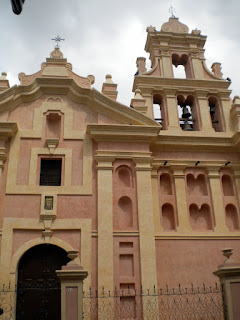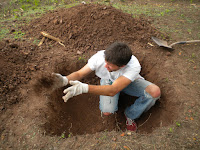 (events correspond to January of 2010)
(events correspond to January of 2010)Me: "No, I don't want to!"
Beatriz: "But I want you to!"
Me: "But seriously, I REALLY don't want to."
Beatriz: "Well, that doesn't really matter, because you're going to do it."
That was basically how that conversation always ended. No matter how much I insisted, it didn't seem to matter. My "boss" Beatriz, the regional coordinator for ADRA in Salta and Jujuy, had put her foot down on the issue: I would be director of the summer project beginning in January.
It's hard to describe Beatriz in words. Passionate, level-headed, and fierce might be some to start off with, but being in the same room with her is an ineffable experience. She is a master of communication, with enemies, loved ones, and even complete strangers alike. She is exceedingly gentle with those in her circle, and cunning with those who are unfortunate enough to find themselves outside it. She has saved the lives of many, yet could kill you in an instant with a stare. And at the end of the day, one thing about her remains true: she always gets what she wants.
But what does she want? The kind of skills and intelligence she possesses could take her anywhere she wanted to be (indeed, she was at one time the top vendor in all of Argentina at one of the leading sales firms in the nation--for four years in a row). You could find her in the most elite circles of politicians, CEOs, or religious leaders... but you won't. Beatriz is nothing more than a volunteer. She takes no salary and no benefits, and her yearly stipend is equal to what other employees make in a month. Why? Because she doesn't want to answer to anyone who might use their authority to get between her and her vision: the destruction of poverty. For Beatriz, nothing is more important, more essential. Her vision is her life, and vice versa. And when Beatriz puts her mind to something, it happens...
Thus, my growingly desperate pleading to not be the director of the summer project was ultimately futile. I certainly had good reasons to object. This being my first big project, I obviously lacked the experience necessary. I'm also the outsider, and worse, the Yankee. From that position, giving orders to people I didn't even know wasn't exactly within my comfort zone. And what's more, I couldn't even speak the language well enough to have a decent conversation! Even if it was all in English, the work of understanding, directing, and overseeing a project seemed well beyond my capabilities.
But in the end, all of those doubts fell on deaf ears, and the first day of the project was upon us...
Location: Southern Region of Salta Capital, Salta, Argentina
Project: Update and renovate a two-story building complex to create a safe and visually appealing space for an ADRA-operated community center, with a pre-school, adult education program, and office.
The community center-to-be was not in great shape. It was originally an annex to the Seventh-Day Adventist church across the street, but due to financial issues they turned it over to be used by ADRA. ADRA would revamp the existing pre-school, create an adult learning program with small business workshops, and open an office to attend to the public. But it couldn't do any of that in the condition it was in. Bushes were overgrown, electrical wires were hanging out, and the cement walls that weren't crumbling or covered in mold were painted with a sky blue that was an insult to the name. Whatever the intent, the tone was certainly unable to capture neither the color of Argentina's flag nor the brilliant skies which that same flag holds and is said to represent.
The project was set to start in a few days, and it was in those moments that I realized how truly difficult it is to plan a project with a non-profit organization. "This color looks great and will last longer but costs twice as much"... "this sandpaper/paint roller/primer/endless list of things work well for interior but not for exterior"... "this is a "special" paint that costs $80 a liter (U$S20) to prevent oxidation, and here's this other to cure humidified walls, and this other to block out water damage"... "this paint only comes in 4 liter cans, even though you need 6 liters"... "this color comes pre-made and this other one you have to do yourself"... and so on and so forth forever and ever amen.
I tried to my best to pretend like I knew what I was doing when helping Beatriz make these decisions, but the truth is I have had very little experience with painting--and none at all with concrete buildings. Eventually, after multiple trips to innumerable hardware stores the eternal search for the best colors, tools, and most importantly, the biggest discount, came to an end. Now the "real" work phase was ready to begin. We had three weeks to finish.
 I nervously walked down the path bordering the then-overgrown patio, "I don't want to do this... I can't do this" subtly repeating itself over and over in my head. But there I was, starting the "speech" I had "prepared" to give to the small group of adolescent volunteers who had already arrived. I greeted everyone with the customary kiss on the cheek and promptly forgot all of their names. As I opened my mouth to begin, I was interrupted: "What can I do?", Julieta asked. Good attitude, I thought.
I nervously walked down the path bordering the then-overgrown patio, "I don't want to do this... I can't do this" subtly repeating itself over and over in my head. But there I was, starting the "speech" I had "prepared" to give to the small group of adolescent volunteers who had already arrived. I greeted everyone with the customary kiss on the cheek and promptly forgot all of their names. As I opened my mouth to begin, I was interrupted: "What can I do?", Julieta asked. Good attitude, I thought.They had no idea what they were getting themselves into.
And neither did I. But I continued on, telling them that before you start any project, it's important to have a vision of what the final product will look like. That was basically the end of my scripted speech, and was probably only half-understood anyways, so I showed them the colors I picked out and then gave my first order: "We're going to put everything from each room in the middle and take everything off of the walls".
Well that took about 15 minutes... good start. "Let's start sanding! Masks on!"
45 minutes later... "We're done!", they say.
Wait... what? How could you possibly finish sanding all of the walls in such a short time?
That's when I learned--or more accurately, remembered--that not everyone has the same level of extremely excessive anal-retentive attention to detail that I do. "Are you sure?" (¿Estás seguro?) was my response, and became my running catch phrase for encouraging them to take a second look (or third, or forth...) at work that they had supposedly "completed" to find things they might have missed. Needless to say, that revision process lasted us until the end of the day, and we were sufficiently tired to stop at around 5PM when Beatriz showed up with bread and dulce de leche for afternoon mate. As we ate and drank around the preschool sized table--with preschool sized chairs--Beatriz and the "old guard" of ADRA volunteers (i.e. the 17 and 18 year olds) told hilarious stories of past projects, which gave the rest of us a window into what the next few weeks were going to look like: fun, crazy, and ridiculous.
It took me awhile, but I eventually realized why Beatriz wanted me to be director. It wasn't because I had the best leadership skills or because I had the most experience in construction--certainly there were others far more qualified than myself in those aspects. It wasn't because it was the easiest way for me to be integrated into this new and unfamiliar group, either. Obviously working together on the same level underneath someone else would have been an easier way to accomplish that goal. I think she chose me precisely because of that persistence I have to ask, "Are you sure?". I may know very little about the task at hand, but no matter how much I know I am always determined that it be accomplished to the highest standard possible. Sometimes people don't like being told they haven't done enough yet--and sometimes I don't say it in the best way either--but encouraging people to be the evaluators of their own work is a valuable learning experience both in the task at hand and for achieving excellence in general. And even when I offend or hurt people, I am equally committed to asking the same question but slightly rephrased, "Are you sure you're OK?", so that our relationship can be as positive as possible as well.
Of course, these are all things I learned from the actual experience of being the director, so it's likely that the real reason I was chosen is for one simple reason that Beatriz later told me when talking about other projects: "the director is always the person that knows the least".










































